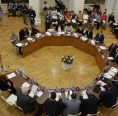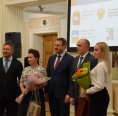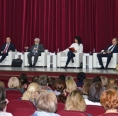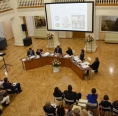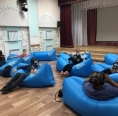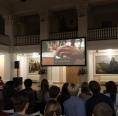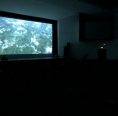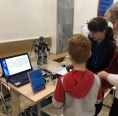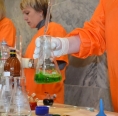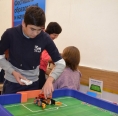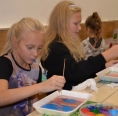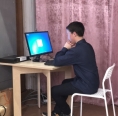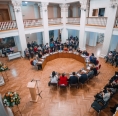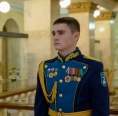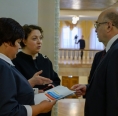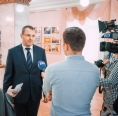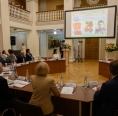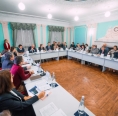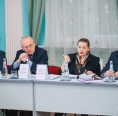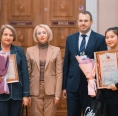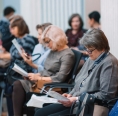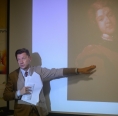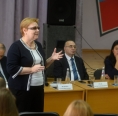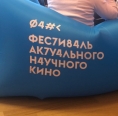-
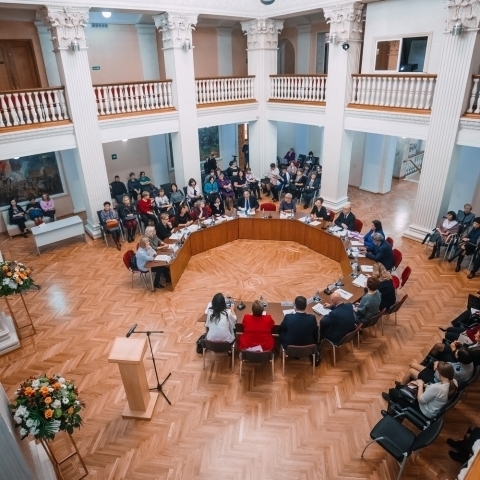
Interregional Festival of Education and Science
-
Address:
-
Partners:
- Magnezit Group
- Festival of contemporary scientific cinema
- Administration of Satka Municipal District
- Moscow State Stroganov Academy of Industrial and Applied Arts
- The Governon of the Chelyabinsk region
- The Russian Academy of Education
- Nosov Magnitogorsk State Technical University
- National History Fund
The first Interregional Festival of Education and Science of the Southern Urals was held in Satka on October 5 and 6, 2018.
The first day of the festival, October 5, was devoted to the discussion of topical issues of education in the halls of the Magnezit Cultural Center.
The round table of the Russian Academy of Education opened the festival with a discussion of modern problems of education and upbringing. The topic of the round table was the interaction of family and school. Teachers, researchers of various institutions, cultural workers, deputies, public figures and government officials participated in the discussion.
“The problems of family and school upbringing are of immediate interest. The lead role in upbringing, of course, remains with the family. But schools have a huge potential for building sound trust-based relationships with a child. And there are already innovative educational practices for building such relationships. These practices should be shared and implemented,” said Artur Rean, Academician of the Russian Academy of Education, Chairman of the Scientific Council on Family and Childhood of the Russian Academy of Education, Professor.
The discussion on upbringing and education was continued within the walls of the Stroitel Cultural Center. The large hall became a discussion platform of the Council on Family and Childhood of the Russian Academy of Education. Teachers and representatives of parent committees of educational institutions of the Satka District attended the event.
The round table was followed by the Stroganov Readings. It is a scientific and practical conference on the Stroganovs in the history of education and science in Russia. The Readings are organized with the participation of the Moscow State Stroganov Academy of Design and Applied Arts and the Russian Historical Society.
It is not a coincidence that the Readings are held in Satka. The settlement of the future city began in the middle of the XVIII century in connection with the construction of a metallurgical mill and an adjacent working settlement. The mill was founded by the most famous industrialists in Russia of that time, i.e.Count S.G. Stroganov, on the site of the Satka forest cottage. The Troitsk-Satka iron-smelting and iron-making mill began to work on November 19, 1758. This date is also considered the birthday of the city. At the end of the XIX century, a magnesite deposit was discovered near the Satkinsky Mill, and, on September 21, 1901, the first bricks with thermal resistance characteristics were released from the batch furnace at the Magnezit Mill. From that moment, the countdown of the new history of the city began.
The idea of the Stroganov Readings was announced in February 2018 upon the signing of a cooperation agreement between the Chelyabinsk Region and the Russian Historical Society. The Governor of the Chelyabinsk region Boris Dubrovsky and the Chairman of the Russian Historical Society Sergey Naryshkin agreed on the need to create large-scale educational projects.
The highlight of the first day of the festival was the awarding of the winners of the first all-Russian student research contest “Small Motherland History – National History”. The presentation of works and the awarding ceremony took place in the lobby of the Magnezit Cultural Center.
Diplomas and gifts were presented to the winners by the Governor of the Chelyabinsk Region Boris Dubrovsky, the Executive Director of the History of the Fatherland Foundation Konstantin Mogilevsky and the President of the Magnezit Group, the Chairman of the Supervisory Board of the Sobranie Fund Sergey Korostelyov.
The purpose of the second day of the festival was to tell and demonstrate in a clear and accessible manner what scientists and representatives of different professions do, how scientific research improves the quality of life, what prospects it opens up to a modern person. An interactive scientific platform in the lobby of the Stroitel Cultural Center was designed to inspire creativity and knowledge.
Robotics and programming exhibits, an Ebru workshop and an animation studio, a kinetic sand laboratory and the Yohokub cardboard constructor were available for visitors. Even the youngest Satka residents tried on the roles of a developer of smart electronics, a cartoon creator or an artist.
The Festival of Actual Scientific Cinema (FANK) organized a platform for VR sessions, as well as kinetic sand and Ebru paints. Popular science films “Alphago” and “Earth: One Amazing Day” were provided by FANK to reveal the results of developments in the field of artificial intelligence and the diversity of natural beauties of the Earth to the audience.
Young Satka residents were delighted with the Bioloid Robot brought by an employee of Magnitogorsk State Technical University named after G.I. Nosov.
2019
At the end of October, Satka became the venue for the Second Interregional Festival of Education and Science. The intensive program of the forum involved many topical issues, including responsible parenthood, developing the competencies of mothers and fathers and the formation of healthy family relations.
The impressive list of the festival participants indicated on its own that there would be a lot of relevant and useful information. Numerous experts represented the Russian Academy of Education, the Institute for Education Development Strategy of the Russian Academy of Education, the Herzen State Pedagogical University of Russia, Magnitogorsk State Technical University named after G.I. Nosov, the Russian Historical Society.
The grand opening of the festival took place in the Magnezit Cultural Center on October 22. The First Deputy Governor of the Chelyabinsk Region Irina Gekht addressed the audience with a welcoming speech, then the following speakers made welcoming speeches for the organizers and participants of the event: Head of the Satka Municipal District Alexander Glazkov; Chairman of the Committee on Social Policy of the Legislative Assembly of the Chelyabinsk Region Alexander Zhuravlev; Academician of the Russian Academy of Education, Head of the Psychology of Family and Childhood Section of the Russian Psychological Society, Doctor of Psychology, Honored Scientist of the Russian Federation Artur Rean; Executive Director of the History of the Fatherland Foundation, Member of the Presidium of the Russian Historical Society, Candidate of Historical Sciences Konstantin Mogilevskiy. Furthermore, Artur Rean read out a greeting from the Deputy Minister of Education of the Russian Federation Viktor Basyuk.
Everything Starts with Family
On the first day of the forum, October 22, special attention was paid to the winners of the second all-Russian student research contest “Family History – National History”. This year, more than 100 students of 9–11 grades from 49 constituent entities of the Russian Federation took part in it. Two of the three winners of the contest came to Satka together with their teachers. Aleksey Slepanov, a future military officer and a student of the 11th grade of the Nizhny Novgorod Cadets School of the Volga Federal District named after Army General V.F. Margelov, took first place for the report on his great-grandfather “Komsomolets and Volunteer, Hero of the Soviet Union Aleksey Slepanov”. Samira Madenova, a tenth-grader from the Astrakhan Region, (Lyceum No. 1 named after A.P. Guzhvina, Kamyzyak) investigated the act of bravery of her grandfather. The result of her painstaking work was the project “The Victory Banner Erected by Kenzhebay Madenov over the Berlin Town Hall”. The granddaughter of the hero was awarded third place for this project.
Second place in the second all-Russian student research contest “Small Motherland History – National History” was taken by Polina Fedotova, a student of the 11th grade from Kingisepp, the Leningrad Region, for the project “Preservation of Historical Memory: The History of My Family”.
The award ceremony was attended by Sergey Korostelev, Chairman of the Supervisory Board of the Sobranie Cultural Initiative Supporting and Preservation Fund, Member of the board of the Federal Project “Close-Knit Family” of the United Russia party; Konstantin Mogilevsky, Executive Director of the History of the Fatherland Foundation, Member of the Presidium of the Russian Historical Society, Candidate of Historical Sciences; Artur Rean, Academician of the Russian Academy of Education, Head of the Psychology of Family and Childhood Section of the Russian Psychological Society, Doctor of Psychology, Honored Scientist of the Russian Federation.
The family topic was continued by the meeting of the Council of the Russian Academy of Education on Family and Childhood on “Family and School as Resources for Success” chaired by Artur Rean, Academician of the Russian Academy of Education, Chairman of the Council on Family and Childhood of the Russian Academy of Education. The speakers of the meeting included Professor of Russian State Pedagogical University named after A.I. Herzen, Director of the Resource Center “Childhood without Violence and Cruelty”, Doctor of Psychology Elena Volkova; Corresponding Member of the Russian Academy of Education, Chief Visiting Teacher and Psychologist of the Ural Federal District Olga Zotova; Advisor to the Director for Training of Scientific Personnel of the Institute for Educational Development Strategy of the Russian Academy of Education, Corresponding Member of the Russian Academy of Education, Professor, Doctor of Pedagogical Sciences, Honored Scientist of the Russian Federation Vladislav Serikov; Chairman of the Committee on Social Policy of the Legislative Assembly of the Chelyabinsk Region Alexander Zhuravlev; Deputy of the Legislative Assembly of the Chelyabinsk Region, President of Magnitogorsk State Technical University, Doctor of Technical Sciences, Valery Kolokoltsev. The following topics were covered in the reports and discussions: the influence of school and family on the formation of the personality of children and adolescents; the prevention of antisocial behavior in children and adolescents; the problem of bullying in schools; the need to form educational programs in schools aimed at informing and preparing high school students forfamily creation in adult life.
Explore your Land and Explore Yourself
Another topic of the first day of the educational platform is the round table on “Historical Tourism in the Ural Federal District”. The round table was hosted by Executive Director of the History of the Fatherland Foundation, Member of the Presidium of the Russian Historical Society, Candidate of Historical Sciences Konstantin Mogilevsky. The following participants should be highlighted: Chairman of the Council of the Branch of the Russian Historical Society in the Chelyabinsk Region, Professor of the South Ural State University, Doctor of Art History, Honored Artist of the Russian Federation Natalia Parfentieva, as well as Member of the Creative Union of Artists of Russia, Advisor to the Rector, Head of the Department of Art History and Humanities of the Moscow State Stroganov Academy of Design and Applied Arts, Candidate of Art Criticism Kirill Gavrilin. There were a lot of people who wanted to visit the meeting and the fireplace hall of the center was absolutely packed. It is widely known that there are many points on the map of the Urals that deserve the attention of researchers. Still, a huge number of places have not yet gained proper popularity although they can surprise even experienced local historians and travelers.
Each of the speakers also expressed their opinion on options contributing to the development of domestic historical tourism: interactive programs, educational quests, historical reenactment, festivals. One of the striking examples is Satka with its industrial sites becoming art objects with the support of the Magnezit Group.
“Activities related to the development of urban environment design and contemporary art are also important for tourism,” said Konstantin Gavrilin, Advisor to the Rector, Head of the Department of Art History and Humanities of the Moscow State Stroganov Academy of Design and Applied Arts, Candidate of Art Criticism. “In fact, we are talking about event tourism which attracts young people to the city, lovers of the new culture. It is also important that the younger generation is formed in a completely different space. On the other hand, it is possible to demonstrate the technologies combining patriotic education, popularization of historical monuments and the new culture here. We can follow excellent examples from international experience”.
Pedagogical Nuances
On October 23, the Stroitel Cultural Center hosted the discussion platform “Education of the 21st Century – Challenges and Opportunities”. Representatives of the Russian Academy of Education, the Ministry of Education of the Russian Federation, the Russian State Pedagogical University named after A.I. Herzen, school teachers and psychologists gathered to discuss topical issues of interaction between family and school.
One more discussion platform was organized on the basis of School No. 40 in Satka. The moderators were Academician of the Russian Academy of Education, Chairman of the Scientific Council of the Russian Academy of Education on Family and Childhood, Head of the Psychology of Family and Childhood Section of the Russian Psychological Society, Doctor of Psychology, Professor Artur Rean; Professor of Russian State Pedagogical University named after A.I. Herzen, Director of the Resource Center “Childhood without Violence and Cruelty”, Doctor of Psychology Elena Volkova; Corresponding Member of the Russian Academy of Education, Chief Visiting Teacher and Psychologist of the Ural Federal District, Doctor of Psychology Olga Zotova; Advisor to the Director for Training of Scientific Personnel of the Institute for Educational Development Strategy of the Russian Academy of Education, Corresponding Member of the Russian Academy of Education, Doctor of Pedagogical Sciences, Honored Scientist of the Russian Federation Vladislav Serikov. Issues on the interaction between family and school, the need to increase parental literacy, the introduction of measures to prevent deviant behavior of teenagers were actively discussed at the event. The question of the formation of modern space in schools as a potential tool for teaching and developing schoolchildren was raised. Heads of educational institutions and school teachers took part in the discussion. The participants exchanged practical experience, outlined the main areas of work and developed a strategy for further cooperation.
After the discussion platform, a round table meeting was held on the topic “School Psychological Service” in School No. 5 in Satka. The meeting members continued to discuss the development of modern schools with an emphasis on the work of school psychological services. Academician of the Russian Academy of Education Artur Rean; Corresponding Member of the Russian Academy of Education Vladislav Serikov; Doctor of Psychology Elena Volkova; Chief Visiting Teacher and Psychologist of the Ural Federal District Olga Zotova attended the event. School psychologists of the Chelyabinsk Region also became active participants in the meeting. During the round table, the main problem areas that require practical solutions in schools on the ground were identified, possible ways to improve the functioning of the psychological services were proposed. In addition, projects of effective interaction of psychologists with teachers, parents and students were presented as an example. Psychologists from regional schools took an active part in the meeting. They were engaged in the discussion and shared their professional experience. The event was a success. The participants got an opportunity to discuss the main problems in the work of the school psychological services and ways to solve them.
At the same time, the scientific and practical conference “Alexander von Humboldt (1769–1859) in the Southern Urals” was held. The conference serves to readd the name of the outstanding German scientist to the list of remarkable figures of science and culture, to identify and mark the memorable places associated with his activities with special signs. The conference announced several events and unique research programs on the eve of the 200th anniversary of Humboldt’s expedition to the Southern Urals in 2029.
In addition, the four-day training seminar “Improving the Professionalism of Teachers in Antisocial Behavior and Pedagogical Communication” prepared jointly with the Laboratory for the Prevention of Antisocial Behavior of the Higher School of Economics was held for school teachers and education managers of the mining region. During this seminar, all interested participants received practical knowledge to work in the field of prevention of antisocial behavior as well as expanded the tools for building meaningful relationships with students.
Within the framework of the Festival of Education and Science, the following guides on bullying prepared by the Laboratory for the Prevention of Antisocial Behavior of the Higher School of Economics and edited by Academician of the Russian Academy of Education, Chairman of the Scientific Council of the Russian Academy of Education on Family and Childhood, Head of the Psychology of Family and Childhood Section of the Russian Psychological Society, Doctor of Psychology, Professor Artur Rean were presented: “Guide to Countering and Preventing Bullying”, “What to Do if your Child is Involved?”, “How Not to Become a Victim and Why You Should Not Bully Others?”.
An Easy-to-Understand Guide to the World of Science
One more festival was held during the forum, the Festival of Actual Scientific Cinema FANK. About 1000 people visited the VR cinema. The FANK prepared a special program for them, which turned out to be equally interesting for both adults and children. The screenings were held in the Magnezit Cultural Center on the basis of the city schools and in the Central Library of Satka.
The short films of 3 to 18 minutes presented different places of our country and even virtual worlds to the viewers. The 360-format contributed to a real sense of presence. For example, the festival participants were carried to 9 reserves to take a look at pristine islands with living creatures thanks to the authors of the film “Zapovediya – Reserves of Russia” Anton Zhdanov and Alexandra Zhmutskoymy. The Australian director Karina Price with her work about the life of a plant cell in 4 unforgettable minutes allowed the participants to see the processes occurring both inside and outside this microscopic “creature”.
In addition, various films created by directors from Russia, Germany, the USA and other countries in 2018 were shown in Satka. Each film is a creative or scientific study, a discovery or a fascinating journey.
For example, it took 30 years for Hermann Waske from Germany to direct “Why Are We Creative?”. The author of the film met with people whose stories and projects seem incredible, intriguing and incomprehensible. The heroes are eminent politicians, artists, Oscar winners and Nobel laureates.
The authors of “Inventing Tomorrow” (directed by Laura Nix, USA) followed the work of six young scientists from Indonesia, India and Mexico. The researchers were developing solutions to the most dangerous environmental problems of our time.
The Russian director Vladislav Grishin created an impressive documentary film titled “Bears of Kamchatka”. It is the result of 7 months of careful observations of several bear families. The viewers found themselves in a fascinating world of volcanoes, rivers and wild animals.
The festival program ended with “The Spirit of the Bauhaus” directed by Niels Bolbrinker (Germany). He reveals the phenomenon of one of the most influential art and architectural schools of his century, the Bauhaus. This film is part of a multimedia project for the 100th anniversary of the Bauhaus. It shows how to create affordable housing, what can be learned from favelas, what geometry and dance have in common.
The festival is a large-scale event that promotes the interaction of representatives of various professional areas: historians, teachers, psychologists, researchers, public and political figures. The festival covers the issues of raising interest in scientific, educational and cultural projects; creation of conditions for psychological support of students of general educational institutions; improving parental literacy in the psychology of family relations, upbringing and development of the child. This festival has already become a tradition for Satka, it contributes to the development of interregional cooperation and attracts wide public attention.
-
2025
Lecture series on art
-
2012
The Russian Museum. Satka
-
2019
MAMM

